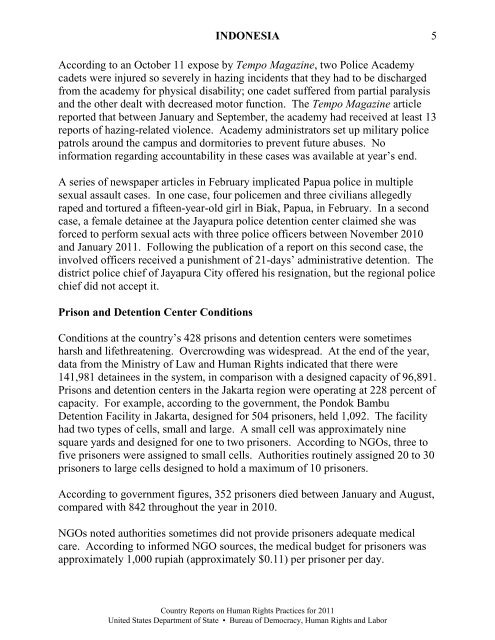INDONESIA EXECUTIVE SUMMARY Indonesia is a multiparty ...
INDONESIA EXECUTIVE SUMMARY Indonesia is a multiparty ...
INDONESIA EXECUTIVE SUMMARY Indonesia is a multiparty ...
Create successful ePaper yourself
Turn your PDF publications into a flip-book with our unique Google optimized e-Paper software.
<strong>INDONESIA</strong> 5<br />
According to an October 11 expose by Tempo Magazine, two Police Academy<br />
cadets were injured so severely in hazing incidents that they had to be d<strong>is</strong>charged<br />
from the academy for physical d<strong>is</strong>ability; one cadet suffered from partial paralys<strong>is</strong><br />
and the other dealt with decreased motor function. The Tempo Magazine article<br />
reported that between January and September, the academy had received at least 13<br />
reports of hazing-related violence. Academy admin<strong>is</strong>trators set up military police<br />
patrols around the campus and dormitories to prevent future abuses. No<br />
information regarding accountability in these cases was available at year’s end.<br />
A series of newspaper articles in February implicated Papua police in multiple<br />
sexual assault cases. In one case, four policemen and three civilians allegedly<br />
raped and tortured a fifteen-year-old girl in Biak, Papua, in February. In a second<br />
case, a female detainee at the Jayapura police detention center claimed she was<br />
forced to perform sexual acts with three police officers between November 2010<br />
and January 2011. Following the publication of a report on th<strong>is</strong> second case, the<br />
involved officers received a pun<strong>is</strong>hment of 21-days’ admin<strong>is</strong>trative detention. The<br />
d<strong>is</strong>trict police chief of Jayapura City offered h<strong>is</strong> resignation, but the regional police<br />
chief did not accept it.<br />
Pr<strong>is</strong>on and Detention Center Conditions<br />
Conditions at the country’s 428 pr<strong>is</strong>ons and detention centers were sometimes<br />
harsh and lifethreatening. Overcrowding was widespread. At the end of the year,<br />
data from the Min<strong>is</strong>try of Law and Human Rights indicated that there were<br />
141,981 detainees in the system, in compar<strong>is</strong>on with a designed capacity of 96,891.<br />
Pr<strong>is</strong>ons and detention centers in the Jakarta region were operating at 228 percent of<br />
capacity. For example, according to the government, the Pondok Bambu<br />
Detention Facility in Jakarta, designed for 504 pr<strong>is</strong>oners, held 1,092. The facility<br />
had two types of cells, small and large. A small cell was approximately nine<br />
square yards and designed for one to two pr<strong>is</strong>oners. According to NGOs, three to<br />
five pr<strong>is</strong>oners were assigned to small cells. Authorities routinely assigned 20 to 30<br />
pr<strong>is</strong>oners to large cells designed to hold a maximum of 10 pr<strong>is</strong>oners.<br />
According to government figures, 352 pr<strong>is</strong>oners died between January and August,<br />
compared with 842 throughout the year in 2010.<br />
NGOs noted authorities sometimes did not provide pr<strong>is</strong>oners adequate medical<br />
care. According to informed NGO sources, the medical budget for pr<strong>is</strong>oners was<br />
approximately 1,000 rupiah (approximately $0.11) per pr<strong>is</strong>oner per day.<br />
Country Reports on Human Rights Practices for 2011<br />
United States Department of State • Bureau of Democracy, Human Rights and Labor
















